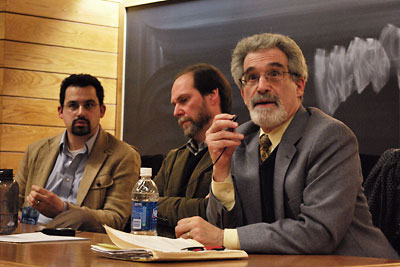Second campus panel meets to dissect rationale behind violence in Gaza
By George Lowery

Following on the heels of a similar discussion 24 hours earlier, another group of panelists met Feb. 19 to speculate on the rationale behind Israel's military actions against the Palestinian territory of Gaza, which ended with a ceasefire Jan. 18.
The fact that two back-to-back panels had met to consider different sides of the issue was, perhaps, not surprising. "When it comes to a topic like what happened in Gaza ... it doesn't have to just be cherry-picking of evidence to back the claims that you want, which is the vast majority, in my opinion, of [what] discussion on this topic ends up being," observed panelist David Patel, Cornell assistant professor of government.
International politics had hit the Cornell campus Feb. 10, when flags commemorating victims on both sides of the conflict were vandalized on the Arts Quad, an act condemned by Cornell President David Skorton. This led to a Feb. 18 panel discussion that drew criticism as unbalanced in favor of the Palestinian point of view.
The Feb. 19 panel, held in Goldwin Smith Hall and sponsored by The Cornell Daily Sun, Cornell Hillel, the Cornell Israel Public Affairs Committee and the Islamic Alliance for Justice, offered sober analyses of what happened in Gaza and why. The conflict took 1,300 Palestinian lives and those of 13 Israelis.
Patel questioned why Hamas continued to launch rocket fire during the month following the ceasefire. Resistance? Brinksmanship? To provoke "disproportionate attacks that would radicalize moderates in Hamas or in Gaza in general, or maybe in Arab public opinion in general," he asked, or to provoke Israeli attacks to consolidate national unity.
Patel suggested the most likely explanation was "intra-Hamas disagreements."
Turning to Israel's reaction, which included targeting the civil police and government buildings in Gaza, Patel speculated that perhaps the attacks were intended to set "up a system of credible deterrence" to warn Hamas it would pay a high price if it fired rockets in the future. Or perhaps it was driven by Israeli domestic and electoral politics, Patel suggested.
The most likely reasons, he offered, were that maybe Israel was "trying to weaken the Qassam brigades relative to the political wing of Hamas," or trying to provoke retaliation by Fatah, the political wing of the Palestinian Liberation Organization, against Hamas. (The Izzedine al-Qassam Brigades is the military wing of Hamas.)
Patel recommended approaching the subject like social scientists, who identify decisions that were made and try to understand what beliefs motivated them.
Panelist Sanford Gutman, a visiting professor of Near Eastern studies at Cornell and professor of history at SUNY Cortland, suggested that the timing of Israeli and U.S. elections played a role in the conflict. The Israeli cabinet "wanted to do this while the Bush administration, which was seen as very sympathetic to Israel, still held control," he said. Gutman noted, "Hostilities ceased just on the day that the Obama administration came into power."
Cornell professor of government Matthew Evangelista, former director of the Peace Studies Program and the third panelist, looked at how international law applies to war. Because Israel is a state and Hamas is not, investigation of charges of war crimes or terrorism is difficult. Self-defense by Israel is covered under law; resistance by Hamas takes place "without the protections of the Geneva Conventions because they're not soldiers organized in traditional fashion," Evangelista said. "If they engage in military force, they risk being treated as common criminals engaging in murder."
Leigha Kemmett '10 organized the event for The Cornell Daily Sun. "We saw a need for dialogue," Kemmett said. "We are an objective party, and we thought we were in a unique position to do this."
On Feb. 23 dozens of pro-Israel students, some carrying placards, rallied on Ho Plaza against Hamas and for peace.
Media Contact
Get Cornell news delivered right to your inbox.
Subscribe